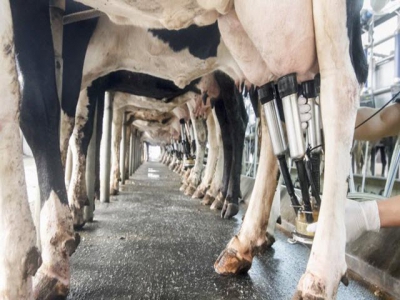Bovine mastitis treatment marks significant progress

Implementing selective dry-cow therapy called the way forward.
The International Dairy Federation (IDF) reported Sept. 24 that a shifting paradigm in the treatment of bovine mastitis was revealed by the new IDF "Animal Health Report."
According to IDF, animal health scientists are making significant progress on mastitis management, which is responsible for up to 85% of the antimicrobials used in the dairy sector.
IDF’s annual "Animal Health Report" includes updates on the latest research developments and has revealed that most IDF member countries reported a large reduction in the rate of clinical mastitis over the last 10 years, with Staphylococcus aureus remaining the main bacteria responsible.
Scientists investigating the microorganisms responsible for mastitis have reported that there is no apparent emergence or progression of resistance to the most commonly used antimicrobials for treating bovine mastitis by S. aureus, IDF said. Yet, these studies need to be extended to other bovine mastitis pathogens.
The author of the analysis, Dr. Olav Østerås, chair of the Standing Committee on Animal Health & Welfare, and Dr. María Sánchez Mainar of IDF, said implementing selective dry-cow therapy is the way forward. The mindset of farmers and veterinarians and their attitude towards reduction of antimicrobial use is crucial for successful implementation of selective therapy at dry-off.
Sánchez Mainar said, “The elimination of an antibiotic shield does not necessarily have to result in a higher rate of new intramammary infections. By modifying the known risk factors and by optimizing herd management, risk levels can be equally low as when prophylactic antimicrobials are used.”
The World Organization of Animal Health (OIE) is collecting data on the use of antibiotics in animals and has proposed the use of animal biomass as denominator for easier comparisons of antimicrobial consumption patterns between regions and countries.
One IDF action team is currently working on improving the detection of both clinical and subclinical intramammary infections with sensor systems and aims at providing guidelines for potential interventions to the farmer.
IDF is a leading source of scientific and technical expertise for all stakeholders in the dairy chain. IDF engages all stakeholders in productive activities and research projects to further current knowledge and science on a wide range of issues.
Through its working bodies, events and work program, IDF provides a common platform, systems and processes for the global dairy sector to come together to reach consensus. Given its consensus-building capacity, IDF represents the global voice of dairy towards stakeholders and intergovernmental organizations.
Related news
 Is there a benefit in feeding pasteurized milk to calves?
Is there a benefit in feeding pasteurized milk to calves? Industry professional discusses the pros and cons of feeding pasteurized milk to dairy calves
 Feeding seaweed may reduce cattle emissions
Feeding seaweed may reduce cattle emissions Researchers at University of California are feeding dairy cattle seaweed in hopes of making dairy production more climate friendly
 Feeding essential oils to ruminants: research, analysis
Feeding essential oils to ruminants: research, analysis Examination of the attributes of botanicals and their effect on rumen, fermentation and metabolism